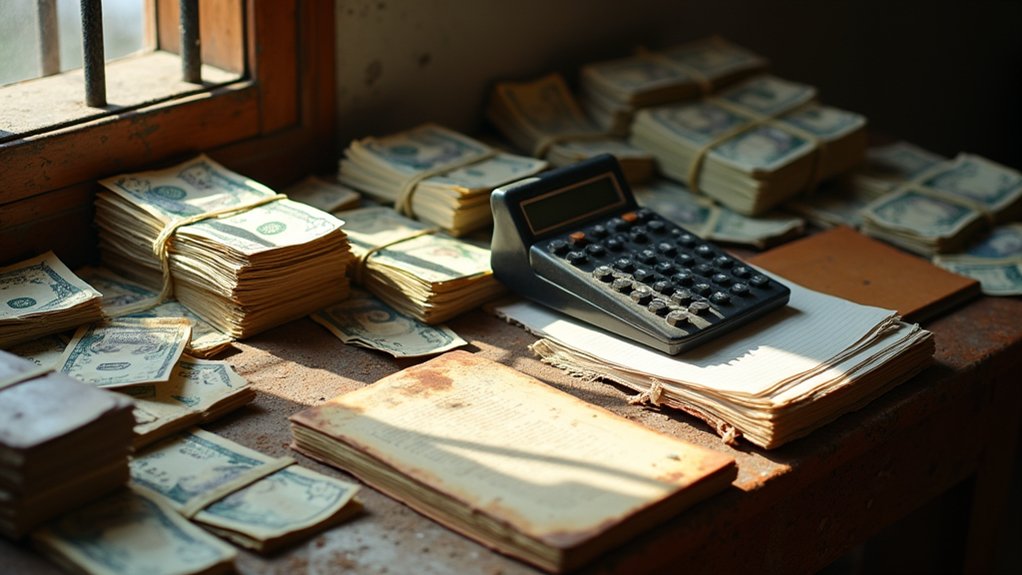Ethiopia ditched its fixed exchange rate in July 2024, let the birr plunge 90%, and told banks to negotiate their own prices—yet retail forex trading remains in legal limbo, neither formally banned nor blessed. The National Bank compiles daily reference rates and auctions dollars to commercial banks, but individual speculators must use offshore platforms because no local brokers exist. Enforcement sits somewhere between indifferent and watchful: nobody prosecutes hobby traders, yet strict currency controls and mandatory documentation mean every dollar crossing borders gets tracked. The piece below unpacks the mechanics, the gaps, and the risks.
Quick Facts That Matter
- Ethiopia shifted to market-based exchange rates in July 2024, ending decades of fixed rates and allowing banks to negotiate freely.
- Retail forex trading exists in regulatory limbo—not explicitly legalized, forcing individual traders to use unregulated offshore platforms instead.
- Licensed banks and forex bureaus handle legitimate spot transactions with publicly posted rates and mandatory NBE documentation for every trade.
- Best trading liquidity occurs during London–New York overlap (3:00–8:00 pm EAT), though traders face payment challenges requiring e-wallet or crypto workarounds.
- NBE enforces strict currency controls with $2,500-per-violation fines while banks lost 1.3 billion birr to fraud in 2023/24.
Overview: Forex Trading in Ethiopia

How does a country with one of Africa's most restrictive currency regimes suddenly pivot to market-based forex trading? Ethiopia flipped the script in July 2024. Directive No. FXD/01/2024 ended decades of fixed rates. Banks now negotiate freely. The National Bank of Ethiopia just watches from the sidelines, compiling reference rates nobody has to follow. It's the fourth currency devaluation since 1991, but this time they're calling it “market-based.” Forex bureaus—bank-affiliated or independent—handle spot transactions under new rules. Rates get posted publicly. Independent bureaus need Birr 15 million in minimum capital plus double that amount locked in a security deposit. The directive also wiped out the NBE's waiting-list that used to control who got foreign exchange for imports and when. Like other East African nations navigating regulatory environments for currency exchange, Ethiopia's transformation happened overnight. Whether it actually works for retail traders is another question entirely.
Is Forex Trading Legal in Ethiopia?

Ethiopia's forex market shifted gears, but retail traders still face a gray reality. The National Bank of Ethiopia controls currency flows. Tightly.
Ethiopia's forex reforms opened doors, but the National Bank's grip remains firm—retail trading exists in regulatory limbo.
In July 2024, new directives loosened things—banks can negotiate rates, forex bureaus got licenses, the birr tanked 90%.
But here's the catch: retail trading isn't explicitly legalized domestically. No local brokers exist for individual speculators. Traders use offshore platforms instead—international brokers licensed elsewhere. It's a workaround, not an invitation.
The NBE doesn't prosecute retail traders, but it doesn't exactly welcome them either. Independent forex bureaus require Birr 15 million in paid-up capital and operate under strict licensing conditions. International regulatory standards like FCA and CySEC compliance matter when choosing offshore brokers—they're the only oversight Ethiopian traders actually get. Understanding the legal framework for forex trading helps traders navigate what's permitted versus what's merely tolerated. Legal? Technically accessible. Supported? That's another story entirely.
Who Regulates Forex Trading in Ethiopia?

Maneuvering Ethiopia's forex regulatory landscape means dealing with one dominant player: the National Bank of Ethiopia. That's it. The NBE reestablished in 1991, serves as central bank and primary regulator of foreign exchange. It authorizes financial institutions, oversees state reserves, adjusts exchange rates.
In July 2024, the NBE dropped Foreign Exchange Directive FXD/01/2024—the fourth radical currency devaluation since the Derg regime fell. The directive consolidated every scattered rule into one framework. Banks now set their own rates freely. The NBE compiles an Indicative Daily Exchange Rate, but it's non-binding guidance. Like other African central banks, the NBE maintains intervention mechanisms to stabilize the currency when market volatility threatens economic stability. Banks report daily, nothing more. The NBE retains enforcement power to impose sanctions including USD 2,500 per violation against banks and licensed entities.
How Forex Trading Works in Ethiopia

The National Bank's oversight tells only half the story. Since July 2024, banks supposedly negotiate rates freely with customers under the new market-based regime. The NBE compiles an “Indicative Daily Exchange Rate” from bank reports—emphasis on *indicative*, meaning it's just a suggestion. Real prices? Those get hammered out in Telegram channels, roadside cafes, and bank branch negotiations. The official system exists more in name than function, insiders say.
Exporters now keep 50% of earnings instead of surrendering everything to the NBE. Mobile apps connect Ethiopian traders to global markets around the clock, assuming you've got internet. The NBE conducts periodic dollar auctions to commercial banks, with the most recent ninth auction offering USD 150 million at a weighted average bid of 138.25 Birr per dollar. Like Zimbabwe's Reserve Bank, which actively shapes its forex market through policy interventions, central banks in emerging economies face constant pressure to balance official mechanisms with parallel market realities.
Best Time to Trade from Ethiopia

Clock-watching matters more in Addis Ababa than most traders realize. The London-New York overlap from 3:00-8:00 pm EAT delivers the day's highest volume and volatility. EUR/USD and GBP/USD move most between 3-6 pm. That's when both markets run simultaneously, creating actual liquidity instead of dead screens.
New York opens around 4:00 pm EAT and closes at midnight. Asian sessions start at 3:00 am—Tokyo runs until noon—but volume stays thin unless someone's trading JPY pairs. Frankfurt enters at 9:00 am. London operates 10:00 am to 7:00 pm. Each currency pair performs differently depending on which financial centers are active, so matching your trades to the right session improves execution quality. Timing isn't everything. But it's not nothing either.
Payments, Deposits and Withdrawals in Ethiopia
Trading hours mean nothing if money can't cross borders. Ethiopian traders face creative workarounds.
Access matters more than opportunity—without payment channels, trading platforms become nothing but locked doors with perfect views.
E-wallets like Skrill and Neteller work. Cryptocurrencies slip through regulatory gaps. Credit cards function when banks won't cooperate.
Standard accounts start at $20—low enough for most beginners. Deposits hit accounts instantly via cards or wallets; bank wires drag on for five days.
Withdrawals reverse the journey, returning funds to their source. The National Bank of Ethiopia looms over every transaction.
Brokers don't charge deposit or withdrawal fees, but currency conversion costs bite. It's a digital dance around traditional banking restrictions.
Understanding how currency exchange markets function helps Ethiopian traders navigate these payment channels more effectively.
Taxes, Reporting and Money Rules in Ethiopia
Beyond the thrill of pip-chasing, Ethiopian forex traders slam into a wall of bureaucratic reality. The National Bank of Ethiopia doesn't mess around.
Every forex bureau transaction gets recorded on NBE-authorized forms. Banks report daily exchange rates using predetermined formats. Miss a beat? That's USD 2,500 per violation, and the NBE can pile on extra sanctions if they're feeling creative.
Travelers enjoy looser rules now on carrying foreign cash, but specific time limits exist for converting currency once you're in-country. Documentation is mandatory. Transparency isn't optional. Ethiopia watches every birr and every dollar that moves.
Similar to how Egypt's Financial Regulatory Authority oversees forex trading activities, regulatory bodies in emerging markets maintain strict supervision over currency exchange operations to ensure market stability and compliance.
Forex Trading Scams and Risks in Ethiopia
Ethiopian forex traders navigating online platforms face a minefield that has nothing to do with market volatility. Banks lost 1.3 billion birr to fraud in 2023/24—a 300 million birr jump from the year before. Twenty-eight of thirty-one banks got hit. Scammers use counterfeit notes, stolen ATMs, forged checks, fake phone calls. Social engineering dominates: fraudsters pose as bank staff via SMS, extracting passwords and moving money. Roughly a third of forex scams spawn on Facebook, TikTok, Instagram, Telegram. The National Bank acknowledged the losses but won't name which institutions failed. Transparency? Not exactly their strong suit.
Quick Q and A
Can I Trade Forex Part-Time While Keeping My Regular Job in Ethiopia?
Individual forex trading regulations in Ethiopia remain unclear based on available information. Prospective part-time traders should consult the National Bank of Ethiopia and licensed financial advisors to verify legal compliance before trading while employed.
What Internet Speed Do I Need for Forex Trading in Ethiopia?
Most forex platforms require only 1–2 Mbps for smooth order execution. Ethiopia's current mobile average of 22.8 Mbps and fixed 8.9 Mbps comfortably exceed this threshold, making reliable trading technically feasible nationwide.
Do Ethiopian Brokers Offer Demo Accounts for Practice Trading?
Yes, Ethiopian-accessible brokers commonly offer demo accounts. Providers including TIOmarkets, OctaFX, XM, Exness, FP Markets, and AvaTrade (Official Site 🔗) supply virtual trading environments with simulated funds, enabling risk-free practice on MT4, MT5, and proprietary platforms before live trading.
Can I Copy Trades From Experienced Forex Traders in Ethiopia?
Copy trading platforms are not available through regulated Ethiopian brokers. While international platforms may offer social trading features, Ethiopian residents face legal restrictions and currency control barriers that effectively prevent accessing copy trading services from experienced forex traders.
What Happens to My Trades if My Power Goes Out?
Open positions remain active on the broker's server during power outages. However, traders cannot manage trades, risking margin calls if markets move adversely. Server-side stop-loss orders stay active, but client-side pending orders may fail.
The Bottom Line
Forex trading in Ethiopia exists in a weird limbo—technically possible, practically difficult, legally murky. The National Bank of Ethiopia isn't making it easy. Tight currency controls mean funding accounts and withdrawing profits becomes a headache. Some traders push through anyway, using offshore brokers and creative payment methods. But the risks pile up fast: regulatory uncertainty, potential scams, withdrawal nightmares, and unclear tax obligations. It's a challenging market for individual traders, period.










